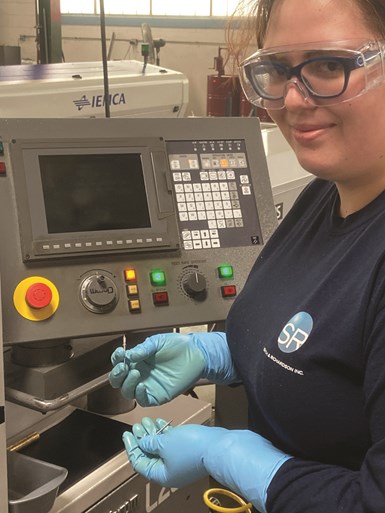Smith & Richardson — Surviving COVID-19
Rich Hoster, president of Smith & Richardson Inc. in Geneva, Illinois, shares his business experiences with COVID-19 challenges.

A Smith & Richardson employee shows a ventilator part.
PMPA: What is the brief history of Smith & Richardson and who do you serve?
Rich Hoster: We were founded in 1921 as a chaplet manufacturer by Warren Smith and Arthur Richardson. The company primarily produced chaplets until 1986 when it purchased a Brown and Sharpe screw machine business in order to diversify. Today, we are the only manufacturer producing chaplets in the U.S. We grew the machining business from 16 to 32 Brown & Sharpe screw machines and, in 1996, added our first CNC machines. We replaced all our cam-driven equipment with Citizen CNC Swiss, Hardinge lathes, Eurotech lathes and Mazak horizontals and verticals. In 2012, we opened a facility in China to take some of the excess chaplet capacity. Today, we do both chaplet product and some machining production in China, and 98% of what we make in China is sold in Asia.
We are fortunate to be very diversified in our customer base, but we do specialize in difficult-to-machine materials and tolerances. We machine a lot of Hastelloy, Inconel and stainless steels for the medical and aerospace industries.
PMPA: How did COVID-19 initially affect your business and did PMPA help in any way?
RH: We first experienced the COVID-19 crisis in China for which we needed to develop a pandemic response plan, which, in turn, prepared us for what happened in the U.S. In the U.S., we started to see business soften prior to many of the lockdowns. The PMPA was instrumental in providing timely information about the swift changes that were occurring and also helped with the definition of essential manufacturing adopted by most states. It was very helpful to receive updates from PMPA’s Miles Free and their partner, The Franklin Partnership, in addition to networking with others in the industry and sharing practices.
PMPA: At the time of this writing, Illinois was particularly strict when it comes to COVID-19 restrictions. How have you managed to stay in business?
RH: We were making ventilator parts and, with the help of The Franklin Partnership, I reached out to all my elected officials and wrote letters expressing our need to produce lifesaving parts. In addition, the Illinois Manufacturing Association put me in touch with the Governor’s office which added our company to a list of suppliers who would need to remain open at all costs. We implemented policies and procedures to disinfect all touch points three times per shift and had a professional company disinfect the building several times per month. We had daily updates with all team members to let them know “the facts,” as opposed to much of the hype on the news. In addition, we started to help our employees who had children affected by the school closures.
PMPA: Leadership is helping your team get through difficulties. What did you find that your people wanted, needed or stepped up themselves to make operating a success?
RH: Everyone took cleaning touch points and distancing seriously, especially because they knew we had to remain open to aid in ventilator part production. The daily meeting (socially distanced) and allowing questions or concerns to be aired was helpful and put individuals at ease.
PMPA: Do you have any advice for other business leaders dealing with the COVID-19 crisis?
RH: Communicate, network and rely on the power of associations to help navigate the challenges we all face. Always keep in mind that you, as a leader, are responsible for the livelihoods of all your team and their families.
PMPA: You have been a strong supporter of PMPA as officer, board member and held a number of finance-related positions. What is it about PMPA that makes you so free with your time to be involved?
RH: The collective wisdom provided by the PMPA and the resources it provides are valuable. I believe in sharing so that we can all grow our manufacturing business, and PMPA has allowed me to grow personally and professionally. It has taught me more than I could have hoped and I think it is important to give back where I can, so I remain committed to helping the association thrive. During both the financial crisis and the COVID-19 crisis, the PMPA has been worth the investment in time and money. The dividends received have been numerous. The friendships built through associating will be lifelong.
Related Content
Process Parsimony — Automation’s Secret Key for Scale and Quality
Automation is thought to be the secret to improving quality in manufacturing. What if I told you it was something else?
Read MoreCraftsman Cribsheet No. 129: How to Beat the Heat
Shops tend to heat up in the summer. Here are some tips for staying cool in the warmer months.
Read MoreUnderstanding Type I and Type II Errors in Precision Machining
The impact of statistical decisions on quality.
Read MoreHiring A New Generation — Generation Z
Be prepared and understand what many don’t know about Gen Z.
Read MoreRead Next
How To (Better) Make a Micrometer
How does an inspection equipment manufacturer organize its factory floor? Join us as we explore the continuous improvement strategies and culture shifts The L.S. Starrett Co. is implementing across the over 500,000 square feet of its Athol, Massachusetts, headquarters.
Read MoreFinding the Right Tools for a Turning Shop
Xcelicut is a startup shop that has grown thanks to the right machines, cutting tools, grants and other resources.
Read More


















